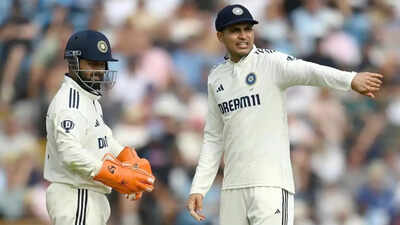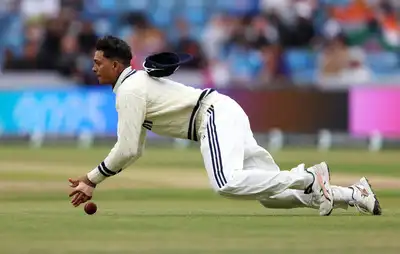Nasser Hussain Analyzes Shubman Gill's Captaincy Debut: A 'Reactive' Approach Compared to Kohli and Sharma
Former England captain Nasser Hussain has weighed in on India's recent defeat in the Leeds Test match, echoing Ravi Shastri's sentiments regarding Shubman Gill's captaincy. Hussain also emphasized India's need for a reliable seam-bowling all-rounder. He observed that Gill's leadership style appeared distinct from the assertive approaches of his predecessors, Virat Kohli and Rohit Sharma, while also raising concerns about India's slip catching and lower-order batting collapses. These factors significantly contributed to England's five-wicket victory.
 *Rishabh Pant and Shubman Gill assume leadership roles for India's Test team.*
*Rishabh Pant and Shubman Gill assume leadership roles for India's Test team.*
The Leeds Test marked Gill's debut as captain after Rohit Sharma's retirement. During the match, England successfully chased down a target of 371 runs, marking their second-highest successful chase at home against India.
Hussain noted that Gill's captaincy seemed to be in its nascent stages, lacking the commanding presence previously established by Kohli and Sharma.
'Wait until August to see what kind of style it’s going to be': Shubman Gill ahead of Headingley Test
"I thought I saw someone just finding his way, honestly," Hussain stated. "You've got to be very careful in the first Test match, the people he's taken over from, Kohli, and then Rohit Sharma. I thought he didn't quite have that on-field aura as the names I mentioned there."
Hussain elaborated on this perceived difference: "You look down on those two previous names, and you immediately see who was in charge of India. I looked down from the press box, the commentary position, there were a lot of captains; it was a bit captaincy by committee, which can happen in your early days as a leader because you still senior players like Rishabh Pant and KL Rahul want to try and help you out as much as possible. I thought he followed the ball a lot. I thought he was reactive as opposed to proactive."
Hussain also expressed surprise that neither Gill nor other senior players intervened in Ravindra Jadeja's bowling strategy on Day 5, where the spinner struggled to effectively utilize the rough patches on the pitch.
"A word with Jadeja, maybe as a young captain, to go to such an experienced spinner, and go, you do know the rough is out there," Hussain explained. "Ravi Shastri and Mark Butcher are up there, going, show us where that ball is pitching, and it was pitching nowhere near the rough. Ravi was saying, a bit slow, a bit wide, bowl in the rough. I was surprised that not one of the senior players or captains went to Jadeja and said, Can we go a little bit wider. But Ravi's right, they lost the game for two things that he couldn't control (catches dropped and batting collapse)."
Furthermore, Hussain addressed India's ongoing search for a seam-bowling all-rounder, drawing comparisons to past players who filled that role.
"The slip cordon and the catching were poor, something that India have done well in the last two or three years and the collapses," Hussain said. "And that concerns me because India has a lower order with spin bowling all-rounders and has had for the last decade, which are magnificent. Ashwin, Jadeja, Axar Patel. In England, they are still looking, I think, for that seam bowling all-rounder, you know, someone like a Hardik Pandya, going back to Ravi's times, Kapil Dev or whatever, they are still looking for that lower-order bowler who can bat. And if they keep going for, what, seven for 41 and six for 30 or whatever, then this could be a quick series. They need to run down the order."
The team's experiments with Nitish Reddy in Australia and Shardul Thakur in Leeds have yet to yield the desired balance in the lower order, as evidenced by the collapses in both innings despite the team scoring five centuries during the match.
Newer articles
Older articles
 Black Caps Set for Blockbuster Home Summer Against Cricket Heavyweights: Australia, England, West Indies, and South Africa to Tour New Zealand
Black Caps Set for Blockbuster Home Summer Against Cricket Heavyweights: Australia, England, West Indies, and South Africa to Tour New Zealand
 Gavaskar Calls for Kuldeep Yadav's Inclusion in 2nd Test Amid Bumrah Fitness Concerns, Cites Birmingham Pitch Conditions
Gavaskar Calls for Kuldeep Yadav's Inclusion in 2nd Test Amid Bumrah Fitness Concerns, Cites Birmingham Pitch Conditions
 Stokes Praises England Openers' Key Role in Record-Breaking Chase Against India
Stokes Praises England Openers' Key Role in Record-Breaking Chase Against India
 Former Selector Blasts India's Fielding Lapses After Test Defeat to England; 'Simple Catches Cost Us'
Former Selector Blasts India's Fielding Lapses After Test Defeat to England; 'Simple Catches Cost Us'
 5 Warning Signs of Prediabetes You Might Be Missing
5 Warning Signs of Prediabetes You Might Be Missing
 Gambhir Stands by India's Lower Order Despite Test Collapse; Cites Missed Catches as Key Factor
Gambhir Stands by India's Lower Order Despite Test Collapse; Cites Missed Catches as Key Factor
 Nitish Rana Set for Delhi Comeback After Disappointing Uttar Pradesh Spell
Nitish Rana Set for Delhi Comeback After Disappointing Uttar Pradesh Spell
 India's First Dengue Vaccine: Phase 3 Trials Approach Finish Line, Promising Hope Against Deadly Virus
India's First Dengue Vaccine: Phase 3 Trials Approach Finish Line, Promising Hope Against Deadly Virus
 Rishabh Pant's Unorthodox Batting Revolutionizing Cricket, Claims Greg Chappell
Rishabh Pant's Unorthodox Batting Revolutionizing Cricket, Claims Greg Chappell
 Mirabai Chanu Reveals Constant Weightlifting Pressure: Training and Diet Consume Her Thoughts, Even With Family
Mirabai Chanu Reveals Constant Weightlifting Pressure: Training and Diet Consume Her Thoughts, Even With Family